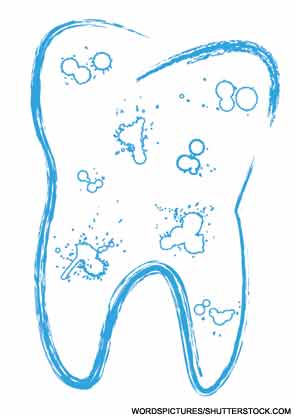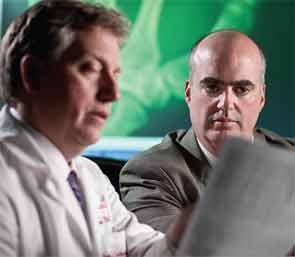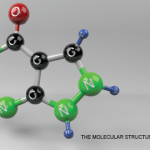
Groundbreaking research into the possible links between the bacteria that lead to gum disease and the risk of developing rheumatoid arthritis (RA) is fueled by support from the Rheumatology Research Foundation, says rheumatologist Ted Mikuls, MD, associate professor of internal medicine at the University of Nebraska in Omaha.
Developing periodontitis, or gum disease that can lead to tooth loss, may somehow be connected to both RA disease severity and a person’s risk for developing RA in the first place, says Dr. Mikuls. “In people with RA, we see higher rates of tooth loss and gum disease, but that’s looking at people after they’ve been diagnosed,” he says. With a grant from the Foundation, Dr. Mikuls and his colleagues are looking closer to find very early signs of RA risk well before diagnosis or even symptomatic disease starts. “There is a recent resurgence of interest in the main bacteria that lead to gum disease, and how they may be creating molecules in the mouth, or changing the proteins in the mouth, and how this may drive the autoantibodies that we see in RA.” Dr. Mikuls’ aim is to better establish those links with a Foundation-supported project grant that was awarded in 2010, part of the Foundation’s Disease Targeted Research Initiative.

One paper already published in Arthritis & Rheumatism in 2012 looked into the links between the bacterium Porphyromonas gingivalis and autoantibodies related to RA in people who were at higher risk for developing RA, including those with close relatives diagnosed with the disease. The early study concluded that infection with this bacterium may play a central role in the early loss of tolerance to autoantibodies like ACPA or rheumatoid factor that occurs in the pathogenesis of RA. Periodontists and rheumatologists are working together on this ongoing research, Dr. Mikuls notes.
Periodontitis is a common condition in the general public, but Dr. Mikuls stresses that this project is just one early step towards understanding its possible role in chronic disease risk. “It’s probably not the cause of all RA, but in some patients could serve as a trigger,” he says. Preventive measures, like maintaining frequency of dental visits for cleanings and good oral health practices, may even play a role in reducing RA risk or symptoms, he notes.
The Foundation’s financial support for this type of research project on the pathogenesis of RA is “absolutely key” if the earliest signs of the disease are to be unearthed, Dr. Mikuls stresses.
“It is a very difficult time for funding, from the federal government and other sources. It is the tightest and most competitive environment in a decade. It is nice to have a disease-focused research grant, where the people reviewing your research really get it,” he says. “They understand the potential impact of your work. Rheumatologists often are underrepresented on national study sections, but we care so much about our patients. I think our community sees that our patients are affected so adversely by their disease, and so the Foundation driving the research agenda in this area is really making a positive impact.”
Rated 4 out of 4 stars by Charity Navigator, the Foundation is a 501(c)3 nonprofit organization with the mission to advance rheumatology research and training to improve the health of people with rheumatic disease. To learn more about the Rheumatology Research Foundation, please visit www.rheumatology.org/Foundation or contact us at [email protected].


